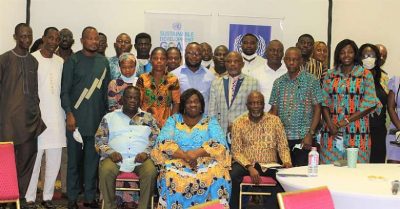Globally, social protection considerations have become an integral part of development strategies to reduce poverty and vulnerability. Social p

Globally, social protection considerations have become an integral part of development strategies to reduce poverty and vulnerability.
Social protection covers a range of policies and programmes needed to reduce the lifelong consequences of poverty and exclusion.
Child grants, cash transfers, old-age pensions, skills development among others help connect individuals with health care, quality education to give children, no matter what circumstances they are born into, a fair chance in life.
As part of efforts to strengthen Ghana’s social protection scheme, and drive inclusive development, the Centre for Democratic Development (CDD) in Ghana, in collaboration with the United Nations Development Programme (UNDP) conducted a study to enhance the existing knowledge base on available community-based support mechanisms that provide social protection to the poor and vulnerable in Ghana.
Among the key findings of the study, financial crises, hikes in food prices, and loss of business capital were the greatest drivers of vulnerabilities among urban households in the middle and southern belts of the country. Again, households are likely to be hit by more than one shock at any given time. The impact of these shocks and stresses are more pronounced among households in rural districts and coping strategies include going without medical care, going without food, or withdrawing children out of school.
The study also reveals that state-provided social protection remains limited in coverage, poorly targeted, inadequate in quantum and highly politicized.
Moreover, despite the role of Community-Based Social Protection Organisations (CBSPOs) as a central support system for households in strengthening community resilience to deal with a variety of shocks and vulnerabilities, the study identified persistent poor governance systems, small operating capital, weak capacities, and limited opportunities for linkages with formal economic systems and institutions as some of the factors hindering the effectiveness of CBSPOs.
Speaking at a validation workshop on the findings of the study with key stakeholders from selected districts in Ghana including civil society organizations, the Head of Governance and Peace Building at UNDP Ghana, Edward Ampratwum called for a stronger collaboration among stakeholders to drive a transformational change that will uplift the poor and vulnerable in society.
“There are more poor and vulnerable individuals in most communities that require urgent attention. Forging partnerships with civil society and other stakeholders is critical in addressing issues concerning social protection and building resilient communities”, he noted.
A Senior Programme Officer of CDD-Ghana, Regina Oforiwaa Amanfo Tetteh underscored the significance of the study in improving the lives of vulnerable people.
‘’It is our hope that the findings of this study will serve as a blueprint for the effective implementation of social protection interventions to ensure that no one is left behind,” she stated.
The study recommends the establishment of pilot programmes to assess the needs, approaches and likely impacts of scaled-up community social protection systems, whilst leveraging that to design community-based systems to have stronger links with existing programmes, and to work in a complementary way. It also suggests the need to develop institutional capacity for state and non-state actors in the implementation of social protection programmes.
COMMENTS